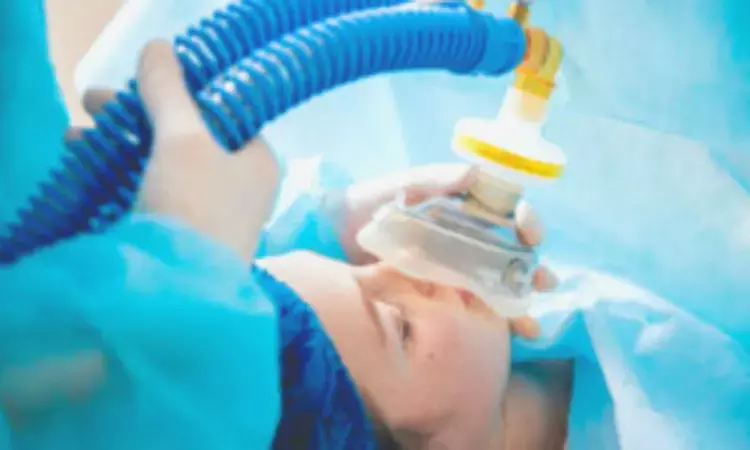- Home
- Medical news & Guidelines
- Anesthesiology
- Cardiology and CTVS
- Critical Care
- Dentistry
- Dermatology
- Diabetes and Endocrinology
- ENT
- Gastroenterology
- Medicine
- Nephrology
- Neurology
- Obstretics-Gynaecology
- Oncology
- Ophthalmology
- Orthopaedics
- Pediatrics-Neonatology
- Psychiatry
- Pulmonology
- Radiology
- Surgery
- Urology
- Laboratory Medicine
- Diet
- Nursing
- Paramedical
- Physiotherapy
- Health news
- Fact Check
- Bone Health Fact Check
- Brain Health Fact Check
- Cancer Related Fact Check
- Child Care Fact Check
- Dental and oral health fact check
- Diabetes and metabolic health fact check
- Diet and Nutrition Fact Check
- Eye and ENT Care Fact Check
- Fitness fact check
- Gut health fact check
- Heart health fact check
- Kidney health fact check
- Medical education fact check
- Men's health fact check
- Respiratory fact check
- Skin and hair care fact check
- Vaccine and Immunization fact check
- Women's health fact check
- AYUSH
- State News
- Andaman and Nicobar Islands
- Andhra Pradesh
- Arunachal Pradesh
- Assam
- Bihar
- Chandigarh
- Chattisgarh
- Dadra and Nagar Haveli
- Daman and Diu
- Delhi
- Goa
- Gujarat
- Haryana
- Himachal Pradesh
- Jammu & Kashmir
- Jharkhand
- Karnataka
- Kerala
- Ladakh
- Lakshadweep
- Madhya Pradesh
- Maharashtra
- Manipur
- Meghalaya
- Mizoram
- Nagaland
- Odisha
- Puducherry
- Punjab
- Rajasthan
- Sikkim
- Tamil Nadu
- Telangana
- Tripura
- Uttar Pradesh
- Uttrakhand
- West Bengal
- Medical Education
- Industry
Sevoflurane may increase intraoperative blood sugar levels in non-diabetic adults undergoing neurosurgery

New Delhi: Intraoperative use of desflurane and sevoflurane in non-diabetic, ASA I and II patients undergoing neurosurgery demonstrated a change in blood sugar pattern in a new study published in the Indian Journal of Anaesthesia.
Sevoflurane causes a gradual increase in intraoperative blood glucose levels, whereas an initial rise followed by a decline was seen with desflurane use. The intraoperative change in blood sugar was statistically notable but was within the normal clinical range.
Anaesthetic agents can affect the neuroendocrine response to surgical stress; this also affects blood sugar levels and other parameters. Surgical stress can cause hyperglycaemia due to neuroendocrine response, insulin resistance and increased secretion of counter-regulatory hormones.
Desflurane and sevoflurane are two popular inhalational agents used widely in neuroanaesthesia due to their positive effects on preserving carbon dioxide reactivity, cerebral metabolism, and rapid emergence.
Against the above background, Ashutosh Kaushal from All India Institute of Medical Sciences (AIIMS), Bhopal, Madhya Pradesh, and colleagues aimed to compare the effect of desflurane and sevoflurane on hourly intraoperative blood glucose levels in non-diabetic patients undergoing intracranial surgery.
For this purpose, the authors enrolled 70 adults aged 18-65 years of ASA (American Society of Anesthesiologists) physical status I and II undergoing elective intracranial surgery for infratentorial and supratentorial lesions. They were randomized to receive either desflurane or sevoflurane as the maintenance anaesthetic agent. Hourly measurement of blood glucose level was done until the surgery completion. Friedman test, non-parametric tests, parametric tests, Chi-square test, generalized estimating equations, and Fisher's exact test were used for data analysis.
The authors reported the following findings:
- In the sevoflurane group, the mean blood glucose (mg/dL) increased from 93.34 at the baseline to a maximum of 102.00 at the 9 hours. This change was statistically significant.
- In the desflurane group, the mean blood sugar (mg/dL) increased from 89.34 at the baseline to a maximum of 92.37 at the 4 hours timepoint and then decreased to 88.50 at 9 hours timepoint.
"Our findings revealed a pattern of blood glucose change with intraoperative use of desflurane and sevoflurane in non-diabetic, ASA I and II patients undergoing neurosurgery," the researchers wrote. "The intraoperative blood sugar changes were statistically significant but were within the normal clinical range."
"Studies looking at the magnitude of change in at-risk patients like diabetics, those on steroids and the critically ill should be undertaken to look into its clinical relevance," they concluded.
Reference:
Kaushal A, Bindra A, Dube SK. Effect of sevoflurane versus desflurane on blood glucose level in patients undergoing intracranial neurosurgery: A randomized controlled study. Indian J Anaesth 2022;66:769-75.
Dr Kamal Kant Kohli-MBBS, DTCD- a chest specialist with more than 30 years of practice and a flair for writing clinical articles, Dr Kamal Kant Kohli joined Medical Dialogues as a Chief Editor of Medical News. Besides writing articles, as an editor, he proofreads and verifies all the medical content published on Medical Dialogues including those coming from journals, studies,medical conferences,guidelines etc. Email: drkohli@medicaldialogues.in. Contact no. 011-43720751


